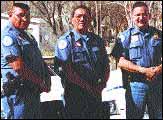|
March 25, 2000
By Jim Mimiaga It took a year to trickle down, but the Ute Mountain Ute tribe is finally seeing its share of a $20 million presidential initiative enacted to better equip law enforcement departments serving the nationís 249 Indian reservations. The Ute Mountain police agency received $280,000 from the federal funding windfall, enough to buy five new cruisers and hire two more officers. Upgraded firearms and new bullet-proof vests were also included in the package. "It was sorely needed, and will allow us to better continue with the our mission of proactive, community policing to prevent crime," said Dusty Whiting, the Ute Mountain police chief. Without a tribal tax collection system to draw upon, U.S. Indian reservations must rely on the federal government to provide the majority of funding for the equipment and employees that make up community service organizations. The Bureau of Indian Affairs is the agency responsible for distributing those resources to Indian reservations, but they have had trouble keeping up with those needs, especially regarding law enforcement, often leaving smaller tribes with inadequate equipment and staffing. Locally the increase resulted in an officer being placed at the tribeís White Mesa community, a remote parcel of the Ute Mountain Ute reservation in southeast Utah. Once at full staff, the BIA police force of seven officers will be better prepared to serve the needs of the 2000 member tribe, a portion of which involves monitoring state and federal highways that bisect the vast reservation. "Every car in the fleet had more than 100,000 miles on it, with some in the 160,000 mile range," Whiting said. "We had the ball joints just fall out on one, causing an officer to crash into a ditch." The BIA underwent a massive restructuring effort in 1998 in order to better fulfill the nationís treaty obligations to Indian tribes following a recommendation by an independent federal study that revealed the agency was hamstrung by an inefficient system mired in a massive government bureaucracy. The streamline effort brought more realistic budgets to tribes that depend on them, and gave department heads and chiefs more direct management over their own operations, including how that budgeted money is spent, Whiting said. The Ute Mountain tribeís law enforcement department is benefiting from that change, which more than doubled their yearly budget from $750,000 in 1998 to an estimated 2001 budget of $2.4 million. Of the budget increase, $1.3 million will accommodate the staffing needs of the tribes ultra-modern, $10 million detention center, set to open soon. The 78-bed facility, which also includes rehab programs and a juvenile wing, creates positions for 22 detention officers, five dispatchers, three supervisors and social service specialists, bringing the total law enforcement staff to 55 employees. "[The increase in funding] allows us to better cover the basics, which is traffic enforcement and pro-active, aggressive patrols that interdict the problem before it becomes a crisis. That is community policing," Whiting said. |
||
|
Copyright © 2000 the Cortez
Journal. All rights reserved. |
